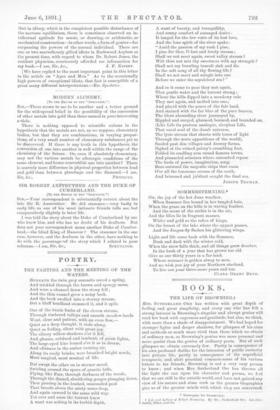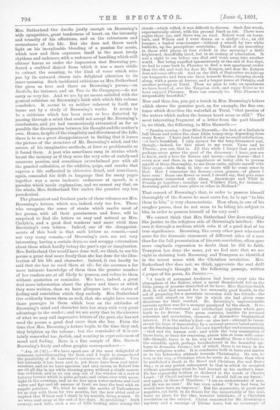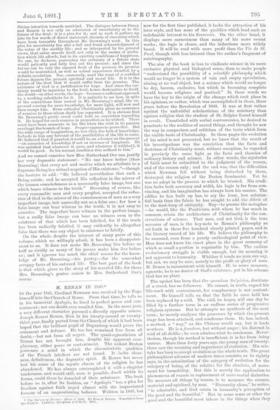BOOKS.
THE LIFE OF BROWNING.t
MRS. SUTHERLAND ORR has written with great depth of feeling and great simplicity, and every one who has felt a strong interest in Browning's singular and abrupt genius will read her book with eagerness and gratitude, but also, we think, with more than a shade of disappointment. We had hoped for stronger lights and deeper shadows, for glimpses of his aims and methods as much more vivid than those which we obtain of ordinary men, as Browning's genius was more personal and more quaint than the genius of ordinary poets. But of such glimpses we obtain extremely few. Partly in consequence of his own profound dislike for the intrusion of public curiosity into private life, partly in consequence of the superficial bruequerie, and alert practical common-sense of his various letters to his friends, Browning is not a very easy person to know ; and when Mrs. Sutherland Orr has thrown all the light she can upon his character and poems, we feel that we are still in the outside world, and have not gained any view of his nature and aims such es the greater biographies give us of the greater minds with which they are concerned. - * Norwegian for Summerjoy.
1- Life and Letters of Ibbort Browning. By Mr.:. Subhorlind Orr. Lo idea : Smith, Elder, and Co. Mrs. Sutherland Orr dwells justly enough on Browning's wide sympathies, great tenderness of heart, on the intensity and tenacity of his affections, and on the robustness and
earnestness of his life. But she does not throw much light on his inexplicable blending of a passion for music, which now and then expresses itself in the most lovely rhythms and cadences, with a rudeness of handling which still oftener leaves us under the impression that Browning pre- ferred a crabbed dialect from which it was a mere riddle to extract the meaning, to the kind of verse which wins you by its outward charm into delighted attention to its inner meaning. Such incidental criticisms as Mrs. Sutherland Orr gives us here and there on Browning's poems,—on
Sordello, for instance, and on Two in the Campagna,—do not carry us very far. And we are by no means satisfied with the general criticism on Browning's faith with which this volume
concludes. It seems to us neither coherent in itself, nor borne out by a study of Browning's works. It seems to be a criticism which has been more or less distorted by passing through a mind that could not accept Mr. Browning's conclusions, and yet had unconsciously attenuated as far as possible the divergencies between his thought and the author's own. Hence, in spite of the simplicity and directness of the Life, there is to us a great disappointment in finding that it leaves the picture of the structure of Mr. Browning's mind, and the nature of his imaginative methods, at least as problematic as it found them. A poet who sometimes sang in strains which haunt the memory as if they were the very echo of stately and sonorous passion, and sometimes overwhelmed you with all the gnarled callosities, or the oddities, quips, and cranks that express a life suffocated in obtrusive detail, and sometimes, again, concealed his drift in language that for many pages together was a mere inchoate endeavour at speech, is a paradox which needs explanation, and we cannot say that, on the whole, Mrs. Sutherland Orr makes the paradox any less paradoxical.
The pleasantest and freshest parts of these volumes are Mrs.
Browning's letters, which are, indeed, only too few. Those who recognise the sense of strain which marks most of her poems, with all their genuineness and force, will be surprised to find the letters as easy and natural as Mrs.
Carlyle's, and, a good deal tenderer and more vivid than Browning's own letters. Indeed, one of the disappoint- ments of this book is that such letters as remain,—and not very many remain,—of Browning's own, are not very interesting, having a certain dryness and scrappy externalism about them which hardly betray the poet's eye or imagination. Mrs. Sutherland Orr would have done well, we think, to use his poems a great deal more freely than she has done for the illus- tration of his life and character. Indeed, it can hardly be said that she has so used them at all ; for she assumes a far more intimate knowledge of them than the greater number of her readers are at all likely to possess, and refers to them without quotation or reminder. We have, indeed, a great deal more information about the places and times at which they were written, than we have glimpses into the states of feeling and conviction which they embody. Mrs. Sutherland Orr evidently knows them so well, that she might have woven
those passages in them which bear on the attitudes of Browning's mind and character into her story with very great advantage to the reader ; and we are sorry that in the absence of what we may call impressive letters of the poet, she has not used the poems a good deal more than she has. From the time that Mrs. Browning's letters begin, to the time they end, they brighten up the volume ; but the remainder of it is cer- tainly somewhat too factish, and wanting in expressiveness of mood and feeling. Here is a fine sample of Mrs. Barrett Browning's lively and often graphic correspondence :— " Aug. 20 ('47).—We have spent one of the most delightful of summers notwithstanding tho heat, and I begin to comprehend the possibility of St. Lawrence's ecstasies on the gridiron. Very hot certainly it has been and is, yet there have been cool inter- misslons, and as we have spacious and airy rooms, as Robert lets me sit all day in my white dressing-gown without a single mascu- line criticism, and as we can stop out of the window on a sort of balcony terrace which is quite private, and swims over with moon- light in the evenings, and as wo live upon water-melons and iced water and figs and all manner of fruit, we bear the heat with an angelic patience. We tried to make the monks of Vallombrosa let us stay with them for two months, but the now abbot said or implied that Wilson and I stank in his nostrils, being women. So we were sent away at the end of five days. So provoking! Such scenery, such hills, such a sea of hills looking alive among the clouds—which rolled, it was difficult to discern. Such fine woods, supernaturally silent, with the ground black as ink. There were eagles there too, and there was no road. Robert went on horse- back, and Wilson and I were drawn on a sledge—(i.e., an old hamper, a basket wine-hamper—without a wheel) by two white bullocks, up the precipitous mountains. Think of my travelling in those wild places at four o'clock in the morning ! a little frightened, dreadfully tired, but in an ecstasy of admiration. It was a sight to see before one died and went away into another world. But being expelled ignominiously at the end of five days, we had to come back to Florence to find a new apartment cooler than the old, and wait for dear Mr. Kenyon, and dear Mr. Kenyon does not come after all. And on the 20th of September wo take up our knapsacks and turn our faces towards Rome, creeping slowly along, with a pause at Arezzo, and a longer pause at Perugia, and another perhaps at Terni. Then we plan to take an apartment we have heard of, over the Tarpeian rock, and enjoy Rome as we have enjoyed Florence. More can scarcely be. This Florence is unspeakably beautiful."
Now and then, too, you get a touch in Mrs. Browning's letters which shows the genuine poet, as, for example, the fine sen- tence which describes the waterfall at Terni, "that passion of the waters which makes the human heart seem so still." The most interesting fragment of a letter from the poet himself is, we think, the following, to Miss Haworth :—
" Tuesday evening.—Dear Miss Haworth,—Do look at a fuchsia in full bloom and notice the clear little honey-drop depending from every flower. I have just found it out to my no small satisfaction, —a bee's breakfast. I only answer for the long-blossomed sort, though,—indeed, for this plant in my room. Taste and be Titania ; you can, that is. All this while I forget that you will perhaps never guess the good of the discovery : I have, you are to know, such a love for flowers and leaves—some leaves—that every now and then, in an impatience at being able to possees myself of them thoroughly, to see them quite, satiate myself with their scent,—bite them to bits—so there Will be some sense in that. How I remember the flowers—even grasses—of places have seen ! Some one flower or weed, I should say, that gets some strangehow connected with them. Snowdrops and Tilsit in Prussia go together ; cowslips and Windsor Park, for instance; flowering palm and some place or other in Holland."
That remark of Browning's that, in order to possess himself thoroughly of the flowers be most cares for, be is apt "to bite them to bits," is very characteristic. How often, in one of his rougher poems, does be not seem to be biting his subject to bits, in order to possess himself of its very soul !
We cannot think that Mrs. Sutherland Orr does anything like justice to the religious side of Browning's intellect. She sees it through a medium which robs it of a good deal of its true significance. Browning, like every other poet who cared
more for the dramatic statement of different sides of a case than for the full presentation of his own conviction, often gave more emphatic expression to doubt than he did to faith. Tennyson has done the same, yet we feel sure that we are right in claiming both Browning and Tennyson as identified in the truest sense with the Christian revelation. Mrs. Sutherland Orr does not, we think, appreciate the real drift of Browning's thought in the following passage, written a propos of his poem, La Saisiaz :— " A touch of autumnal freshness had barely crept into the atmosphere of the Saleve, when a moral thunderbolt foil on the little group of persons domiciled at its base : Miss Egerton-Smith died, in what had seemed for her unusually good health, in the act of preparing for a mountain excursion with her friends—the words still almost on her lips in which she had given some directions for their comfort. Mr. Browning's impressionable nervous system was for a moment paralysed by the shock. It re- vived in all the emotional and intellectual impulses which gave birth to La Saisiaz. This poem contains, besides its personal reference and association, elements of distinctive biographical interest. It is the author's first—as also last—attempt to recon- struct his hope of immortality by a rational process based entirely on the fundamental facts of his own knowledge and consciousness —God and the human soul ; and while the very assumption of these facts, as basis for reasoning, places him at issue with scien- tific thought, there is in his way of handling them a tribute to the scientific spirit, perhaps foreshadowed in the beautiful epi- logue to Dramatis Persona-, but of which there is no trace in his earlier religious works. It is conclusive both in form and matter as to his heterodox attitude towards Christianity. He was no less, in his way, a Christian when he wrote La Saisiaz than when he published a Death in the Desert and Christmas Eve and Easter Day ; or at any period subsequent to that in which he accepted without questioning what he had learned at his mother's knee.. He has repeatedly written or declared in the words of Charles Lamb : 'If Christ entered the room I should fall on my knees ; ' and again, in those of Napoleon : I am an understander of men, and Re was no man.' He has even added : 'If he had boon, he would have been an impostor.' But the arguments, in groat part negative, set forth in La Saisiaz for the immortality of the soul, leave no place for the idea, however indefinite, of a Christian revelation on the subject. Christ remained for Mr. Browning a mystery and a message of Divine Love, but no messenger of Divine intention towards mankind. The dialogue between Fancy and Reason is not only an admission of uncertainty as to the future of the Soul : it is a plea for it ; and as such it gathers up into its few words of direct statement, threads of reasoning which have been traceable throughout Mr. Browning's work. In this plea for uncertainty lies also a full and frank acknowledgment of the value of the earthly life ; and as interpreted by his general views, that value asserts itself, not only in the means of proba. tion which life affords, but in its existing conditions of happiness. No one, he declares, possessing the certainty of a future state would patiently and fully live out the present ; and since the futxre can be only the ripened fruit of the present, its promise would be neutralised, as well as actual experience dwarfed, by a definite revelation. Nor, conversely, need the want of a certified future depress the present spiritual and moral life. It is in the nature of the Soul that it would suffer from the promise. The existence of God is a justification for hope. And since the cer- tainty would be injurious to the Soul, hence destructive to itself, the doubt—in other words, tho hope—becomes a sufficient approach to, a working substitute for it. It is pathetic to see how, in spite of the convictions thus rooted in Mr. Browning's mind, the ex- pressed craving for more knowledge, for more light, will now and then escape him. Even orthodox Christianity gives no assurance of reunion to those whom death has separated. It is obvious that Mr. Browning's poetic creed could hold no conviction regarding it. He hoped for such reunion in proportion as he wished. There must have been moments in his life when the wish in its passion overleapt the bounds of hope. Prospice appears to prove this. But the wide range of imagination, no less than the lack of knowledge, forbade in him any forecast of the possibilities of the life to come. He believed that if granted, it would be .an advance on the present —an accession of knowledge if not an increase of happiness. He was satisfied that whatever it gave, and whatever it withheld, it would be good. In his normal condition this sufficed to him."
And we cannot conceive how Mrs. Sutherland Orr can justify her very dogmatic statement : "No one knew better [than Browning] that every act and motive which we attribute to a
Supreme Being is a virtual negation of His existence,"—though she hastens to add : "He believed nevertheless that such a
Being exists ; and he accepted His reflection in the mirror of the human consciodsness as a necessarily false image, but one which bears witness to the truth." Browning of course, like every reasonable man and every prophet, accepted the reflec- tion of God in the mirror of the consciousness of man as a very imperfect image, but assuredly not as a false one ; for how a false image can bear witness to the truth, it is not easy to conceive. The imperfect bears witness to the perfect image,
but a really false image can bear no witness even to the existence of that which has been falsified, for if the truth has been radically falsified, it may evidently be altogether false that there was any object in existence to falsify.
On the whole, despite the interest of many parts of this volume, which we willingly admit, it has been a disappoint- ment to us. It does not make Mr. Browning live before us half as vividly as many of his poems make him live before us ; and it ignores too much the chief source for the know- ledge of Mr. Browning,—his poetry,—for the somewhat scrappy facts of his outward life. The best part of the book is that which gives us the story of his married life, for there Mrs. Browning's genius comes to Mrs. Sutherland Orr's
rescue.








































 Previous page
Previous page